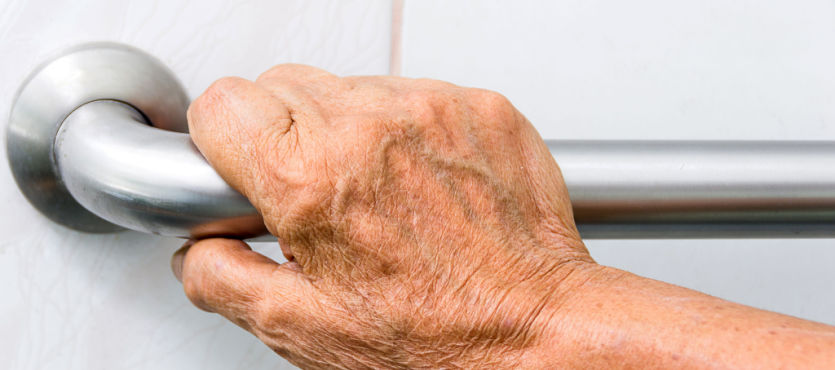General
-
Consider a medical alert or a buddy system.
-
Keep a fire extinguisher and smoke detector on every floor.
-
Use extreme caution when smoking. Never smoke when alone or in bed.
-
Always get up slowly after sitting or lying down. Take your time, and make sure you have your balance.
-
Wear proper fitting shoes with low heels.
-
Use a correctly measured walking aid.
-
Remove or tack down all scatter rugs.
-
Remove electrical or telephone cords from traffic areas.
-
Avoid using slippery wax on floors.
-
Wipe up spills promptly.
-
Avoid standing on ladders or chairs.
-
Have sturdy rails for all stairs inside and outside the house.
-
Use only non-glare 100 watt or greater incandescent bulbs (or the fluorescent equivalents).
-
Make sure that all stair cases have good lighting with switches at top and bottom.
-
Staircase steps should have a non-slip surface.
Bathroom
-
Leave a light on in your bathroom at night.
-
Use recommended bath aids, securely installed on the walls of the bath/shower stall and on the sides of the toilet.
-
Skid-proof the tub and make sure the bath mat has a non-slip bottom.
-
To avoid scalds, turn water heater to 120 degrees Fahrenheit or below.
-
Mark cold and hot faucets clearly.
-
Use door locks that can be opened from both sides.
-
If possible, bathe only when help is available.
Kitchen
-
Keep floors clean and uncluttered.
-
Illuminate work areas.
-
Mark “on” and “off” positions on appliances clearly and with bright colors.
-
Store sharp knives in a rack.
-
Use a kettle with an automatic shut off.
-
Store heavier objects at waist level.
-
Store hazardous items separate from food.
-
Avoid wearing long, loose clothing when cooking over the stove.
-
Make sure food is rotated regularly. Check expiration dates.
Drug Safety
-
Review your medicines frequently with your doctor or pharmacist and when you take new medication.
-
Make sure medicines are clearly labeled.
-
Read medicine labels in good light to ensure you have the right medicine and always take the correct dose
-
Dispose of any old or used medicines.
-
Never borrow prescription drugs from others.
-
Check with your doctor or pharmacist before you mix alcohol and your drugs.
-
Have medication dispensed in a bubble pack or convenient dispenser.
-
Check with your doctor or pharmacist before mixing non-prescription drugs and prescription drugs.

